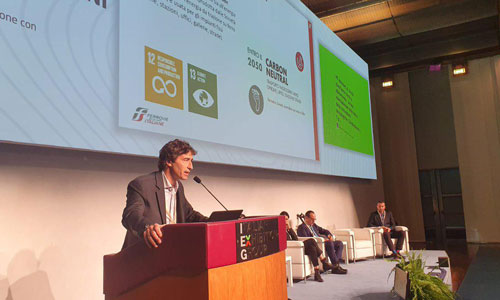FS Italiane to the States General of the Green Economy
The role of rail transport in the strategy of change
Until 8 November, Rimini will host the 23rd edition of Ecomondo, the international fair dedicated to sustainable development. Over a thousand exhibitors from more than 30 countries around the world will present new proposals, strategies and solutions to the green economy sector.
As part the event, FS Italiane will participate in the States General of the Green Economy, with Lorenzo Radice, Head of Sustainability of the FS Group, talking about the company’s key role in sustainable mobility.
FS’ contribution on the path to sustainability

Ferrovie dello Stato Italiane intends to increasingly establish itself as a company capable of operating in compliance with the principles of sustainability, maintaining the highest levels of ethics and integrity. Together with the stakeholders, the Group’s top three long-term objectives have been defined in terms of Emissions (carbon neutrality by 2050), Safety (best in class in Europe, with the vision of zero fatal incidents by 2050) and Sustainable Mobility (by 2050, increasing the modal shift in favour of collective and shared mobility in Italy by 15% compared to 2015; 50% of goods to be transported via rail by 2050).
The company continues on the journey towards innovation in means of transport, optimising material and digital infrastructures with the aim of bettering the transport service and creating value for all people and for all territories crossed.
In 2017 and 2018, FS Italiane has successfully experimented with sustainable financial instruments, issuing two green bonds for the purchase of high-speed, regional and freight trains, being locomotives with high energy efficiency and elevated recyclability.
Investments in new vehicles, and the purchasing policies in general, are increasingly considering energy efficiency characteristics and sustainable requirements:
- The Frecciarossa 1000 is the first high-speed train in the world to have an Environmental Product Declaration;
- The new regional trains Pop and Rock permit a 30% reduction in specific energy consumption compared to trains of the previous generation;
- Busitalia is renewing its fleet with more efficient and less polluting vehicles;
- On the freight front, 100 new locomotives and 714 wagons are set to arrive;
The Rete Ferroviaria Italiana was a winner at the Procurement Awards Beyond Saving 2018, in the “Ethical and Sustainable Purchases” category for best practices in purchasing processes.
Investments in vehicles are accompanied by those on infrastructure networks and hubs in order to develop an even more sustainable and integrated mobility system in collaboration with all institutions throughout the territory, especially in urban and metropolitan areas that constitute one of the most obvious points in the mobility crisis. Railway stations will be the heart of the smart cities of the future, thanks to accessibility and multi-modal designs.
The environmental integration of engineering works of great extent and complexity, such as railway and road infrastructure, is subject to participatory discussions with stakeholders. This activity, enacted as of the initial phases of the project through to the implementation and the operation phases regarding the infrastructure, is carried out with an awareness that the work constitutes an opportunity to enhance the territories crossed, favouring the continuity of the natural and urban fabric thanks to design solutions aimed at integrating environmental, economic and social objectives.
A truly sustainable approach thus inspires the company both in the strategies and in the daily activities, with a clear sense of perspective that is also attentive to broader horizons.
The challenge is not simply that of combining the economic and financial objectives of FS Italiane with the profiles of social and environmental responsibility and with the general principles of sustainable development, but rather to make sustainable action the true driver of development and value creation for shareholders and for the entire Italian system